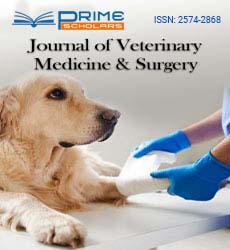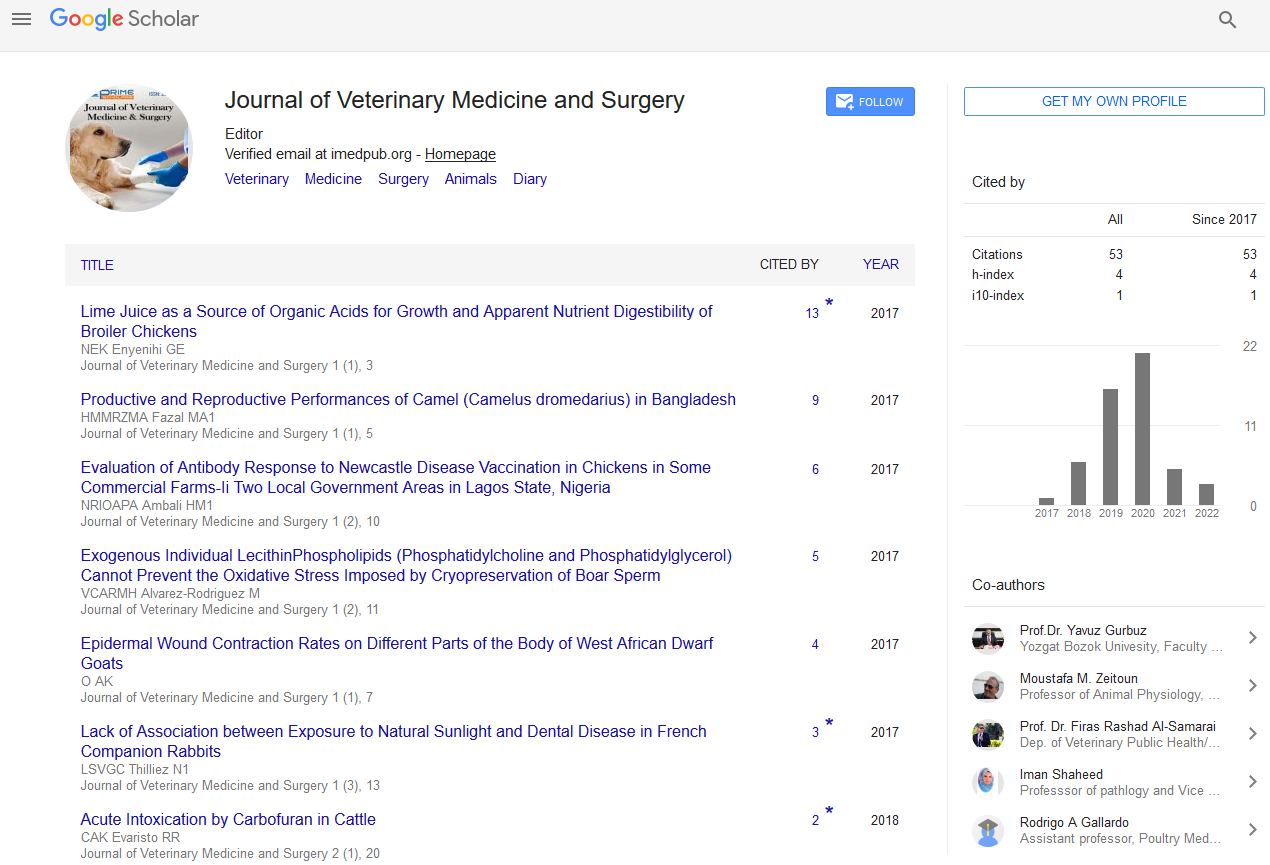Short Communication - (2023) Volume 7, Issue 3
Advances in Veterinary Medicine: Nurturing the Health and Well-being of Our Animal Companions
Tom Dutch*
Department of Veterinary Sciences, University of Bristol, UK
*Correspondence:
Tom Dutch,
Department of Veterinary Sciences, University of Bristol,
UK,
Email:
Received: 30-Aug-2023, Manuscript No. IPJVMS-23-19152;
Editor assigned: 01-Sep-2023, Pre QC No. IPJVMS-23-19152 (PQ);
Reviewed: 15-Sep-2023, QC No. IPJVMS-23-19152;
Revised: 20-Sep-2023, Manuscript No. IPJVMS-23-19152 (R);
Published:
27-Sep-2023, DOI: 10.36648/2574-2868.7.3.21
Introduction
Veterinary medicine plays a crucial role in safeguarding the
health and well-being of our beloved animal companions. Over
the years, significant advancements in this field have not only
enhanced our ability to diagnose and treat various conditions
but have also deepened our understanding of the intricate
connections between animal and human health. This article
explores the diverse facets of veterinary medicine, from its
historical roots to the latest innovations that are reshaping the
landscape of animal care. The origins of veterinary medicine
can be traced back thousands of years, with early civilizations
recognizing the importance of animal health for agricultural
and domestic purposes. In ancient times, various cultures
had their own methods of treating and caring for animals,
often based on a mix of traditional knowledge and practical
experience. However, it was not until the 18th century that
formal veterinary education and practices began to take shape.
The first veterinary school was established in Lyon, France, in
1761, marking the beginning of a more organized approach to
animal healthcare. Since then, veterinary medicine has evolved
into a multidisciplinary field encompassing surgery, internal
medicine, pathology, radiology, and numerous specialized
areas [1,2].
Description
One of the most remarkable advances in veterinary medicine
is the development of sophisticated diagnostic technologies.
These tools allow veterinarians to identify and understand the
root causes of various ailments, enabling more targeted and
effective treatments. Advanced imaging techniques such as
X-rays, ultrasound, MRI, and CT scans provide veterinarians
with detailed insights into the internal structures of animals.
These modalities are invaluable for diagnosing conditions
ranging from fractures to tumors. Blood tests, urinalysis, and
other laboratory procedures help veterinarians assess the
overall health of animals, detect infections, and monitor organ
function. The advent of automated analyzers has significantly
improved the speed and accuracy of these diagnostic tests. Just
as in human medicine, genetic testing has become a powerful
tool in veterinary diagnostics. It allows for the identification
of inherited diseases and facilitates early intervention to
prevent or manage these conditions. Preventive medicine is a
cornerstone of modern veterinary care. Vaccination programs
have been instrumental in controlling and eradicating infectious
diseases that pose significant threats to animal populations
[3,4]. Vaccines are designed to stimulate the immune system,
helping animals build resistance to specific pathogens. For
example, in the realm of companion animals, vaccines protect
against common diseases such as rabies, canine distemper,
feline leukemia, and more. In livestock, vaccines play a crucial
role in preventing the spread of diseases like foot-and-mouth
disease and brucellosis.
Conclusion
Veterinary medicine has come a long way from its early roots,
evolving into a sophisticated and multidisciplinary field that
plays a vital role in the health and well-being of animals.
Advances in diagnostics, surgery, preventive medicine, and
emerging technologies continue to shape the landscape of
veterinary care. As the field progresses, the principles of
One Health, ethical considerations, and a commitment to
continuous education will guide veterinarians in providing
optimal care for our cherished animal companions. Through
collaboration and innovation, the future of veterinary medicine
holds the promise of improved outcomes, enhanced quality of
life for animals, and a deeper understanding of the intricate
connections between the health of animals and humans.
Acknowledgement
None.
Conflict Of Interest
None.
References
- Kastelic JP (2016) Critical evaluation of scientific articles and other sources of information: An introduction to evidence-based veterinary medicine. Theriogenology 66(3):534-542.
[Crossref] [Google Scholar] [PubMed]
- Weisse C (2015) Veterinary interventional oncology: From concept to clinic. Vet J 205(2):198-203.
[Crossref] [Google Scholar] [PubMed]
- Hess L, Crosta L, Forbes NH, Lierz M, Shoemaker N (2013) Veterinary medicine in Europe: Issues and concerns. J Avian Med Surg 27(2):152-155.
[Crossref] [Google Scholar] [PubMed]
- Pitzer JB (2020) Highlights of veterinary entomology, 2019. J Med Entomol 57(5):1336-1341.
[Crossref] [Google Scholar] [PubMed]
Citation: Dutch T (2023) Advances in Veterinary Medicine: Nurturing the Health and Well-being of our Animal Companions. J Veterinary Med. 7:21.
Copyright: © 2023 Dutch T. This is an open-access article distributed under the terms of the Creative Commons Attribution License, which permits unrestricted use, distribution, and reproduction in any medium, provided the original author and source are credited.

